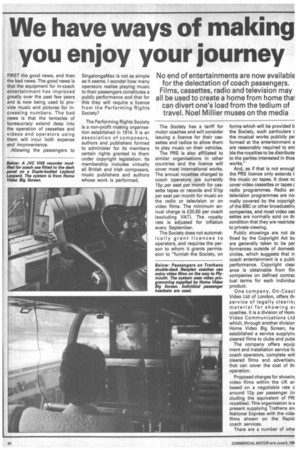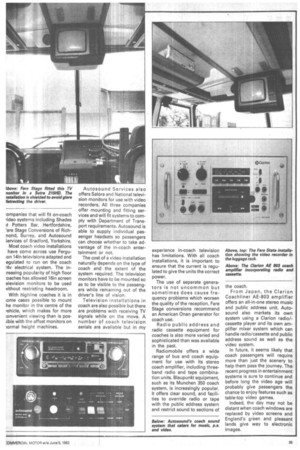We have ways of making you enjoy your journey
Page 32

Page 33

If you've noticed an error in this article please click here to report it so we can fix it.
No end of entertainments are now available for the delectation of coach passengers. Films, cassettes, radio and television may all be used to create a home from home thai can divert one's load from the tedium of travel. Noel Millier muses on the media
FIRST the good news, and then the bad news. The good news is that the equipment for in-coach entertainment has improved greatly over the past few years and is now being used to provide music and pictures for increasing numbers. The bad news is that the tentacles of bureaucracy extend deep into the operation of cassettes and videos and operators using them will incur both expense and inconvenience.
Allowing the passengers to SingalongaMax is not as simple as it seems. I wonder how many operators realise playing music to their passengers constitutes a public performance and that for this they will require a licence from the Performing Rights Society?
The Performing Rights Society is a non-profit making organisation established in 1914. It is an association of composers, authors and publishers formed to administer for its members certain rights granted to them under copyright legislation. Its membership includes virtually all British and Irish composers, music publishers and authors whose work is performed. The Society has a tariff for motor coaches and will consider issuing a licence for their cassettes and radios to allow them to play music on their vehicles.
The PRS is also affiliated to similar organisations in other countries and the licence will cover most international works. The annual royalties charged to coach operators are currently 15p per seat per month for cassette tapes or records and 51/2p per seat per month for music on the radio or television or on video films. The minimum annual charge is £20.50 per coach {excluding VAT). The royalty rate is adjusted for inflation every September.
The Society does not automatically grant licences to operators, and requires the person to whom it grants permission to "furnish the Society, on forms which will be provided b the Society, such particulars c the musical works publicly pel formed at the entertainment a are reasonably required to cm' ble the royalties to be distribute to the parties interested in thos works."
And, as if that is not enougt the PRS licence only extends t the music on tapes. It does nc cover video cassettes or tapes c radio programmes. Radio an television programmes are nal mally covered by the copyrigh of the BBC or other broadcastinl companies, and most video cas settes are normally sold on th condition that they are restrictel to private viewing.
Public showings are not de fined by the Copyright Act bu are generally taken to be per formances outside of dornest) circles, which suggests that in coach entertainment is a publil performance. Copyright clear ance is obtainable from filn companies on defined contrac tual terms for each individua product.
One company, On-Coacl Video Ltd of London, offers thi service of legally clearin material for showing oi coaches. It is a division of Horn Video Communications Ltd which, through another division Home Video Big Screen, ha established a service supplyim cleared films to clubs and pubs The company offers equip ment and installation service fo coach operators, complete witl cleared films and advertisim that can cover the cost of till operation.
Proposed charges for showinl video films within the UK ar based on a negotiable rate c around 12p per passenger (in eluding the equivalent of PR; royalties). This organisation is a present supplying Trathens an National Express with the videl films shown on the Rapid coach services.
There are a number of othe :ompanies that will fit on-coach video systems including Shades it Potters Bar, Hertfordshire, 'are Stage Conversions of Richnond, Surrey, and Autosound iervices of Bradford, Yorkshire. Most coach video installations have come across use Fergu;on 14in televisions adapted and egulated to run on the coach tily electrical system. The in:reasing popularity of high floor *aches has allowed 16in screen elevision monitors to be used vithout restricting headroom. With highline coaches it is in ;ome cases possible to mount he monitor in the centre of the vehicle, which makes for more :onvenient viewing than is posiible with the offset monitors on tormal height machines. Autosound Services also offers Salora and National television monitors for use with video recorders. All three companies offer mounting and fitting services and will fit systems to comply with Department of Transport requirements. Autosound is able to supply individual passenger headsets so passengers can choose whether to take advantage of the in-coach entertainment or not.
The cost of a video installation naturally depends on the type of coach and the extent of the system required. The television monitors have to be mounted so as to be visible to the passengers while remaining out of the driver's line of vision.
Television installations in coach are also possible but there are problems with receiving TV signals while on the move. A number of coach television aerials are available but in my experience in-coach television has limitations. With all coach installations, it is important to ensure that the current is regulated to give the units the correct power.
The use of separate generators is not uncommon but sometimes does cause frequency problems which worsen the quality of the reception. Fare Stage conversions recommend an American Onan generator for coach use.
Radio public address and radio cassette equipment for coaches is also more varied and sophisticated than was available in the past.
Radiomobile offers a wide range of bus and coach equipment for use with its stereo coach amplifier, including threeband radio and tape combination units. Blaupunkt equipment, such as its Munchen 350 coach system, is increasingly popular. It offers clear sound, and facilities to override radio or tape with the public address system and restrict sound to sections of the coach.
From Japan, the Clarion Coachliner AE-803 amplifier offers an all-in-one stereo music and public address unit. Autosound also markets its own system using a Clarion radio!cassette player and its own amplifier mixer system which can handle radio/cassette and public address sound as well as the video system.
In future, it seems likely that coach passengers will require more than just the scenery to help them pass the journey. The. recent progress in entertainment systems is sure to continue and before long the video age will probably give passengers the chance to enjoy features such as table-top video games.
Indeed, the day may not be distant when coach windows are replaced by video screens and England's green and pleasant lands give way to electronic images.


























































